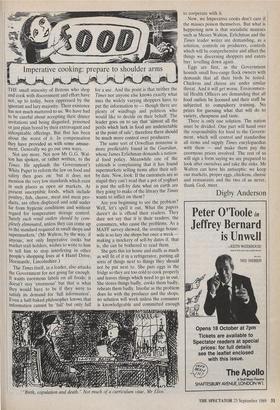Imperative cooking: prepare to shoulder arms I z • •
. •
hl 1014L egi n hl 1014L egi n
THE small minority of Britons who shop and cook with discernment and effort have not, up to today, been oppressed by the ignorant and lazy majority. Their existence has not much mattered to us. We have had to be careful about accepting their dinner invitations and being disgusted, poisoned or just plain bored by their extravagant and inhospitable offerings. But that has been about the worst of it. In compensation they have provided us with some amuse- ment. Generally we go our own ways.
Not any more. Not now Mr G.G. Wal- ton has spoken, or rather written, to the Times. He applauds the Government's White Paper to reform the law on food and safety then goes on: `but it does not mention the very low standards which exist in such places as open air markets. At Present susceptible foods, which include Poultry, fish, cheese, meat and meat pro- ducts, are often displayed and sold under far from hygienic conditions and without regard for temperature storage control. Surely such retail outlets should be com- pletely eliminated, unless they can come up to the standard required in small shops and supermarkets.' (Mr Walton, by the way, if anyone, not only Imperative cooks but market stall-holders, wishes to write to him to tell him to stop interfering in other people's shopping lives at 4 Hazel Drive, Horricastle, Lincolnshire.) The Times itself, in a leader, also attacks the Government for not going far enough. It wants enormous labels on all foods: it doesn't stay 'enormous' but that is what they would have to be if they were to satisfy its demand- for 'full information'. Even a half-baked philosopher knows that information cannot be 'full' but only full' for a use. And the point is that neither the Times nor anyone else knows exactly what uses the widely varying shoppers have to put the information to — though there are plenty of windbags and politicos who would like to decide on their behalf. The leader goes on to say that 'almost all the perils which lurk in food are undetectable at the point of sale'; therefore there should be much more control over producers.
The same sort of Orwellian nonsense is more predictably found in the Guardian, whose James Erlichman demands a nation- al food policy. Meanwhile one of the tabloids is complaining that it has found supermarkets selling items after their sell- by date. Now, look: If the customers are so stupid they can't read that a pot of yoghurt is past the sell-by date what on earth are they going to make of the library the Times wants to inflict on them?
Are you beginning to see the problem? Well, let's spell it out. What the papers daren't do is offend their readers. They dare not say that it is their readers, the consumers, who cause the problems. As a MAFF survey showed, the average house- wife is so lazy she shops but once a week — making a mockery of sell-by dates if, that is, she can be bothered to read them.
She gets this lot home and stuffs as much as will fit of it in a refrigerator, putting all sorts of things next to things they should not be put next to. She puts eggs in the fridge so they are too cold to cook properly and leaves things which need to go in out. She stores things badly, cooks them badly, reheats them badly. Insofar as the problem does lie with the producer and the shops, no solution will work unless the consumer is knowledgeable and committed enough "Birth, copulation and death." Not much of a curriculum vitae, Mr Eliot.' to cooperate with it.
Now, we Imperative cooks don't care if the masses poison themselves. But what is happening now is that socialistic maniacs such as Messrs Walton, Erlichman and the Times leader writer are demanding, as a solution, controls on producers, controls which will be comprehensive and affect the things we discerning shoppers and eaters buy: levelling down again.
Eggs are first, as the Government hounds small free-range flock owners with demands that all their birds be tested. Chickens and cheese are under similar threat. And it will get worse. Environmen- tal Health Officers are demanding that all food outlets be licensed and their staff be subjected to compulsory training. No prizes for guessing what that will do to variety, cheapness and taste.
There is only one solution. The nation must be divided. One part will hand over the responsibility for food to the Govern- ment, which will control and standardise all items and supply Times encylopaedias with them — and make them pay the enormous prices involved. The rest of us will sign a form saying we are prepared to look after ourselves and take the risks. Mr Walton can have his antiseptic: we keep our markets, proper eggs, chickens, cheese and restaurants and the two of us never, thank God, meet.
Digby Anderson


























































 Previous page
Previous page